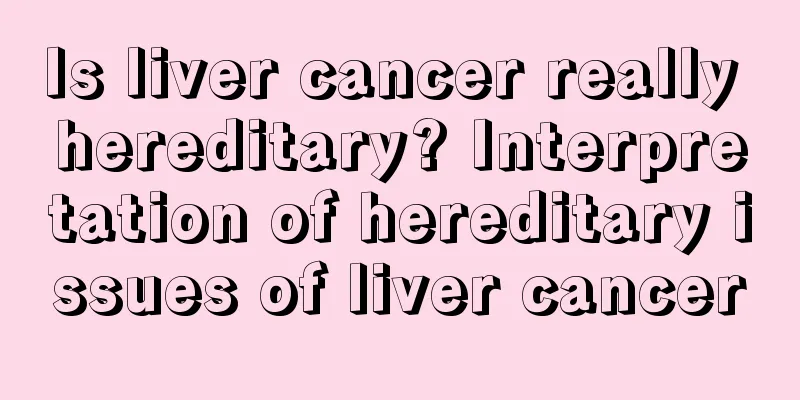Is liver cancer really hereditary? Interpretation of hereditary issues of liver cancer

|
As doctors, we have indeed found that liver cancer runs in families. In some patients, 4 or 5 people in a family all suffer from liver cancer. Such case reports can also be seen frequently in medical journals. So is liver cancer hereditary? In this regard, we have specifically consulted the latest literature reports at home and abroad and would like to give you an explanation here. Liver cancer is a polygenic hereditary disease As to whether liver cancer is a genetic disease, experts at home and abroad have basically reached a consensus: liver cancer is a multi-gene genetic disease, and its occurrence is the result of the combined effects of genetic and environmental factors. In other words, genetic factors are the basis, which determines the susceptibility of the human body to tumors; environmental factors are the inducement, which contributes to the occurrence of liver cancer. Studies have found that genetic polymorphisms of some genes related to immunity, inflammation, DNA repair, cell proliferation, apoptosis, carcinogenic compounds, and alcohol metabolism and detoxification are closely related to susceptibility to liver cancer. For example, the liver is an important detoxification organ in the human body. Some people have a strong ability to degrade carcinogens, so less is accumulated in the body, while others have a poor detoxification ability and more is accumulated, which is the polymorphism of the human body's toxic metabolism enzymes. It determines the different susceptibility of individuals to chemical carcinogens and mutagens in the environment, thus leading to different susceptibility to tumors. The main reason for familial clustering of liver cancer The main reasons for the familial clustering of liver cancer we see are: People in the same family have similar genetic characteristics and are more likely to have the same liver cancer susceptibility genes. This results in similar susceptibility to liver cancer among people in the same family, especially direct relatives. Epidemiological surveys have also found that the direct relatives of liver cancer patients have a significantly higher chance of developing liver cancer than the general population. The vertical and horizontal transmission characteristics of hepatitis B lead to familial clustering of hepatitis B patients. Mother-to-child transmission of hepatitis B (i.e. vertical transmission) causes mothers infected with the hepatitis B virus to pass the virus to the next generation during or after childbirth. Hepatitis B is a disease transmitted by body fluids, and close contact between family members makes the incidence of hepatitis B much higher than that of the general population. Clinically, patients with hepatitis B-related liver cancer are often found, and many of their parents, siblings, and children are hepatitis B patients. It is recognized worldwide that hepatitis B can cause liver cancer, namely the "hepatitis B-cirrhosis-liver cancer" trilogy. The familial clustering of hepatitis B has led to the familial clustering of liver cancer to a certain extent. The same family has the same living environment and eating habits. Studies have found that drinking water pollution, aflatoxin, nitrosamines and other toxic substances are closely related to the occurrence of liver cancer. The distribution of liver cancer is regional. For example, liver cancer is highly prevalent in the Northeast, the southeast coastal areas, Guangxi, Yunnan and other places. This is related to local environmental factors and eating habits. The concentrated residence of family members and the same eating habits also contribute to the family clustering of liver cancer to a certain extent. In summary, the occurrence of liver cancer is the result of the combined effects of genetic factors and external conditions. It is a multi-factor, multi-stage evolution process with a genetic tendency. However, we cannot confuse heredity with infection. Liver cancer is not an infectious disease and is not directly contagious, while hepatitis B is contagious. |
Recommend
How to prevent allergic reactions to paclitaxel in the treatment of ovarian cancer
In clinical practice, paclitaxel can be used for ...
Things to note when eating pineapple on an empty stomach in the morning
Maybe many of us love to eat pineapple. It is tru...
Effects of drugs on pituitary tumors
In recent years, the incidence of pituitary tumor...
Drugs that nourish the liver, kidneys, and qi and blood
According to the theory of traditional Chinese me...
What's the matter with the itchy pimples on my butt?
Skin pimples have always been a major annoyance f...
Does bladder cancer require cystoscopy?
This depends on how long it has been since the tr...
The efficacy and function of blue crystal
Blue crystal is blue crystal. Crystal comes in ma...
Four types of early esophageal cancer
Esophageal cancer is a malignant tumor that occur...
Is bladder cancer contagious
Nowadays, people's living standards have impr...
What are the functions and effects of chickpeas and how to eat them?
Chickpeas have many uses in life. For example, th...
Frostbite can also be fatal. It is not recommended to rub your ears in hot water
Doctors point out that frostbite is a cold-relate...
What disease does fissured tongue indicate
The tongue is the most important organ in the hum...
Cancer cells spread, why are patients still full of energy? Reveal the medical truth behind it
Cancer, as a major threat to human health, often ...
How to relieve neck cramp pain
If you don't pay attention in your daily life...









